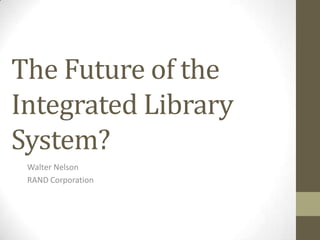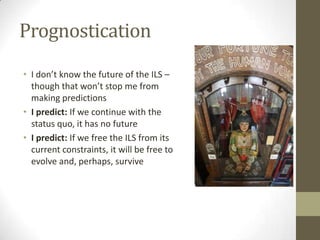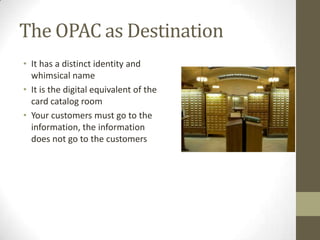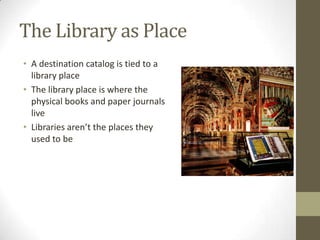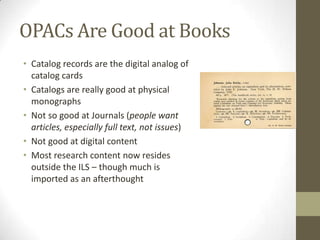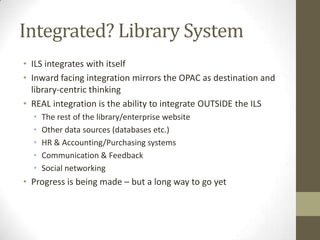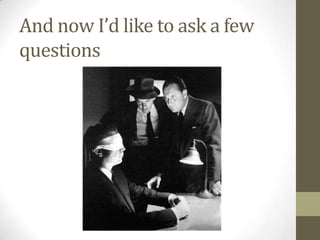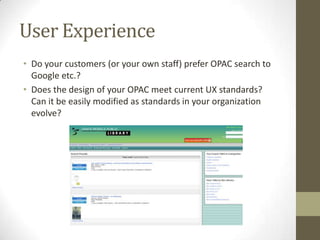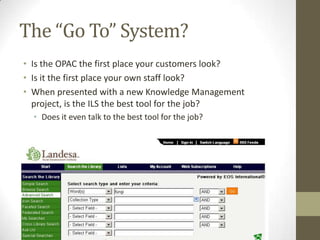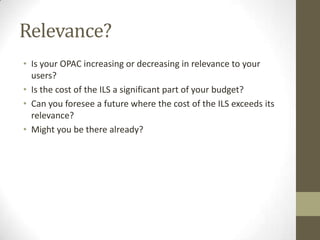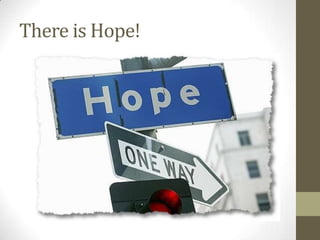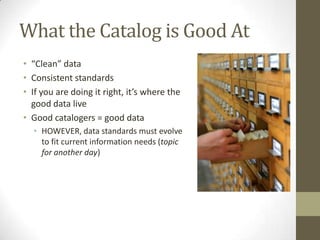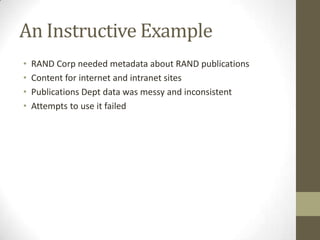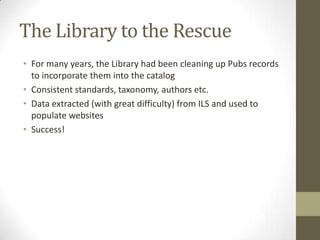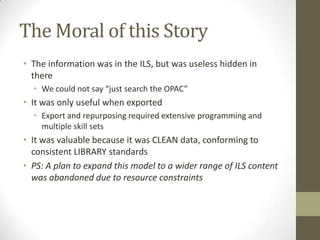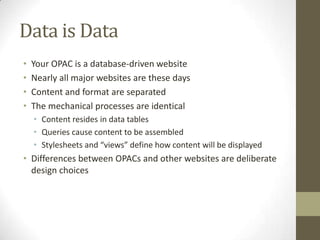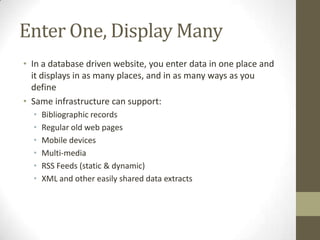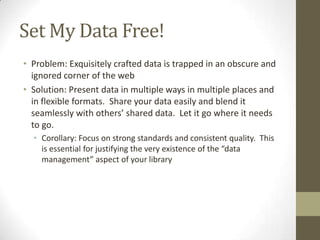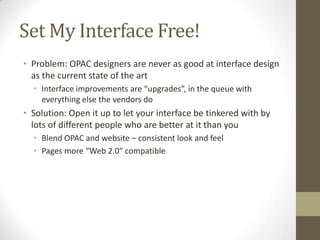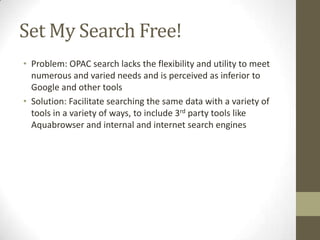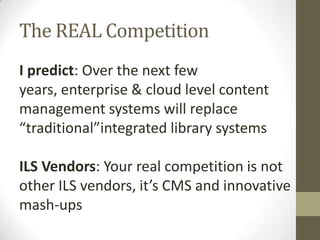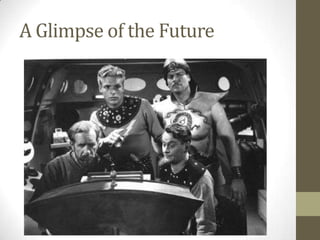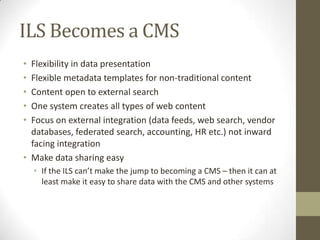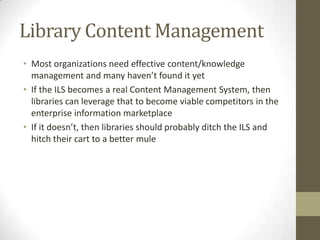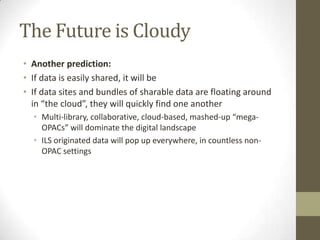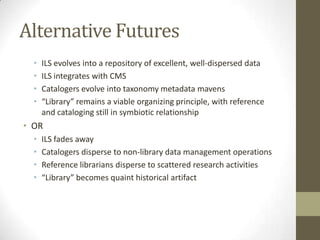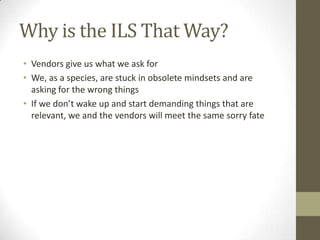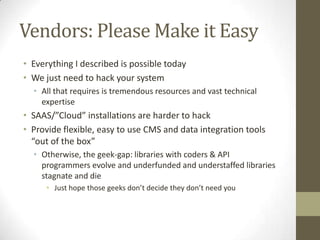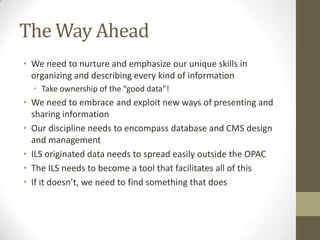The Future Of The Integrated Library System
- 1. The Future of the Integrated Library System?Walter NelsonRAND Corporation
- 2. PrognosticationI donŌĆÖt know the future of the ILS ŌĆō though that wonŌĆÖt stop me from making predictionsI predict: If we continue with the status quo, it has no futureI predict: If we free the ILS from its current constraints, it will be free to evolve and, perhaps, survive
- 3. The OPAC as DestinationIt has a distinct identity and whimsical nameIt is the digital equivalent of the card catalog roomYour customers must go to the information, the information does not go to the customers
- 4. The Library as PlaceA destination catalog is tied to a library placeThe library place is where the physical books and paper journals liveLibraries arenŌĆÖt the places they used to be
- 5. OPACs Are Good at BooksCatalog records are the digital analog of catalog cardsCatalogs are really good at physical monographsNot so good at Journals (people want articles, especially full text, not issues)Not good at digital contentMost research content now resides outside the ILS ŌĆō though much is imported as an afterthought
- 6. Integrated? Library SystemILS integrates with itselfInward facing integration mirrors the OPAC as destination and library-centric thinkingREAL integration is the ability to integrate OUTSIDE the ILSThe rest of the library/enterprise websiteOther data sources (databases etc.)HR & Accounting/Purchasing systemsCommunication & FeedbackSocial networkingProgress is being made ŌĆō but a long way to go yet
- 7. And now IŌĆÖd like to ask a few questions
- 8. User ExperienceDo your customers (or your own staff) prefer OPAC search to Google etc.?Does the design of your OPAC meet current UX standards? Can it be easily modified as standards in your organization evolve?
- 9. The ŌĆ£Go ToŌĆØ System?Is the OPAC the first place your customers look?Is it the first place your own staff look?When presented with a new Knowledge Management project, is the ILS the best tool for the job?Does it even talk to the best tool for the job?
- 10. Relevance?Is your OPAC increasing or decreasing in relevance to your users?Is the cost of the ILS a significant part of your budget?Can you foresee a future where the cost of the ILS exceeds its relevance?Might you be there already?
- 11. There is Hope!
- 12. What the Catalog is Good AtŌĆ£CleanŌĆØ dataConsistent standardsIf you are doing it right, itŌĆÖs where the good data liveGood catalogers = good dataHOWEVER, data standards must evolve to fit current information needs (topic for another day)
- 13. An Instructive ExampleRAND Corp needed metadata about RAND publicationsContent for internet and intranet sitesPublications Dept data was messy and inconsistentAttempts to use it failed
- 14. The Library to the RescueFor many years, the Library had been cleaning up Pubs records to incorporate them into the catalogConsistent standards, taxonomy, authors etc.Data extracted (with great difficulty) from ILS and used to populate websitesSuccess!
- 15. The Moral of this StoryThe information was in the ILS, but was useless hidden in thereWe could not say ŌĆ£just search the OPACŌĆØIt was only useful when exportedExport and repurposing required extensive programming and multiple skill sets It was valuable because it was CLEAN data, conforming to consistent LIBRARY standardsPS: A plan to expand this model to a wider range of ILS content was abandoned due to resource constraints
- 17. Data is DataYour OPAC is a database-driven websiteNearly all major websites are these daysContent and format are separatedThe mechanical processes are identicalContent resides in data tablesQueries cause content to be assembledStylesheets and ŌĆ£viewsŌĆØ define how content will be displayedDifferences between OPACs and other websites are deliberate design choices
- 18. Enter One, Display ManyIn a database driven website, you enter data in one place and it displays in as many places, and in as many ways as you defineSame infrastructure can support:Bibliographic recordsRegular old web pagesMobile devicesMulti-mediaRSS Feeds (static & dynamic)XML and other easily shared data extracts
- 19. My List of Demands
- 20. Set My Data Free!Problem: Exquisitely crafted data is trapped in an obscure and ignored corner of the webSolution: Present data in multiple ways in multiple places and in flexible formats. Share your data easily and blend it seamlessly with othersŌĆÖ shared data. Let it go where it needs to go.Corollary: Focus on strong standards and consistent quality. This is essential for justifying the very existence of the ŌĆ£data managementŌĆØ aspect of your library
- 21. Set My Interface Free!Problem: OPAC designers are never as good at interface design as the current state of the artInterface improvements are ŌĆ£upgradesŌĆØ, in the queue with everything else the vendors doSolution: Open it up to let your interface be tinkered with by lots of different people who are better at it than youBlend OPAC and website ŌĆō consistent look and feelPages more ŌĆ£Web 2.0ŌĆØ compatible
- 22. Set My Search Free!Problem: OPAC search lacks the flexibility and utility to meet numerous and varied needs and is perceived as inferior to Google and other toolsSolution: Facilitate searching the same data with a variety of tools in a variety of ways, to include 3rd party tools like Aquabrowser and internal and internet search engines
- 23. The REAL CompetitionI predict: Over the next few years, enterprise & cloud level content management systems will replace ŌĆ£traditionalŌĆØintegrated library systemsILS Vendors: Your real competition is not other ILS vendors, itŌĆÖs CMS and innovative mash-ups
- 24. Example: DrupalWidely used Open Source CMS Multiple authors for varied and rich web contentMARC import, export and displayXML import and export toolsFull text (inside digital documents) and faceted searchAlso search engine and web 2.0 friendlyOne tool manages your whole web presenceFeatures like Circulation, Acquisition and Journal management are primitive compared to an ILSThe Question: are those additional features worth $n thousand a year?
- 25. A Glimpse of the Future
- 26. ILS Becomes a CMSFlexibility in data presentationFlexible metadata templates for non-traditional contentContent open to external searchOne system creates all types of web contentFocus on external integration (data feeds, web search, vendor databases, federated search, accounting, HR etc.) not inward facing integrationMake data sharing easyIf the ILS canŌĆÖt make the jump to becoming a CMS ŌĆō then it can at least make it easy to share data with the CMS and other systems
- 27. Library Content ManagementMost organizations need effective content/knowledge management and many havenŌĆÖt found it yetIf the ILS becomes a real Content Management System, then libraries can leverage that to become viable competitors in the enterprise information marketplaceIf it doesnŌĆÖt, then libraries should probably ditch the ILS and hitch their cart to a better mule
- 28. The Future is CloudyAnother prediction:If data is easily shared, it will beIf data sites and bundles of sharable data are floating around in ŌĆ£the cloudŌĆØ, they will quickly find one anotherMulti-library, collaborative, cloud-based, mashed-up ŌĆ£mega-OPACsŌĆØ will dominate the digital landscapeILS originated data will pop up everywhere, in countless non-OPAC settings
- 29. Alternative FuturesILS evolves into a repository of excellent, well-dispersed dataILS integrates with CMSCatalogers evolve into taxonomy metadata mavensŌĆ£LibraryŌĆØ remains a viable organizing principle, with reference and cataloging still in symbiotic relationshipORILS fades away Catalogers disperse to non-library data management operationsReference librarians disperse to scattered research activitiesŌĆ£LibraryŌĆØ becomes quaint historical artifact
- 30. Why is the ILS That Way?Vendors give us what we ask forWe, as a species, are stuck in obsolete mindsets and are asking for the wrong thingsIf we donŌĆÖt wake up and start demanding things that are relevant, we and the vendors will meet the same sorry fate
- 31. Vendors: Please Make it EasyEverything I described is possible todayWe just need to hack your system All that requires is tremendous resources and vast technical expertise SAAS/ŌĆØCloudŌĆØ installations are harder to hackProvide flexible, easy to use CMS and data integration tools ŌĆ£out of the boxŌĆØOtherwise, the geek-gap: libraries with coders & API programmers evolve and underfunded and understaffed libraries stagnate and dieJust hope those geeks donŌĆÖt decide they donŌĆÖt need you
- 32. The Way AheadWe need to nurture and emphasize our unique skills in organizing and describing every kind of informationTake ownership of the ŌĆ£good dataŌĆØ!We need to embrace and exploit new ways of presenting and sharing informationOur discipline needs to encompass database and CMS design and managementILS originated data needs to spread easily outside the OPACThe ILS needs to become a tool that facilitates all of thisIf it doesnŌĆÖt, we need to find something that does
